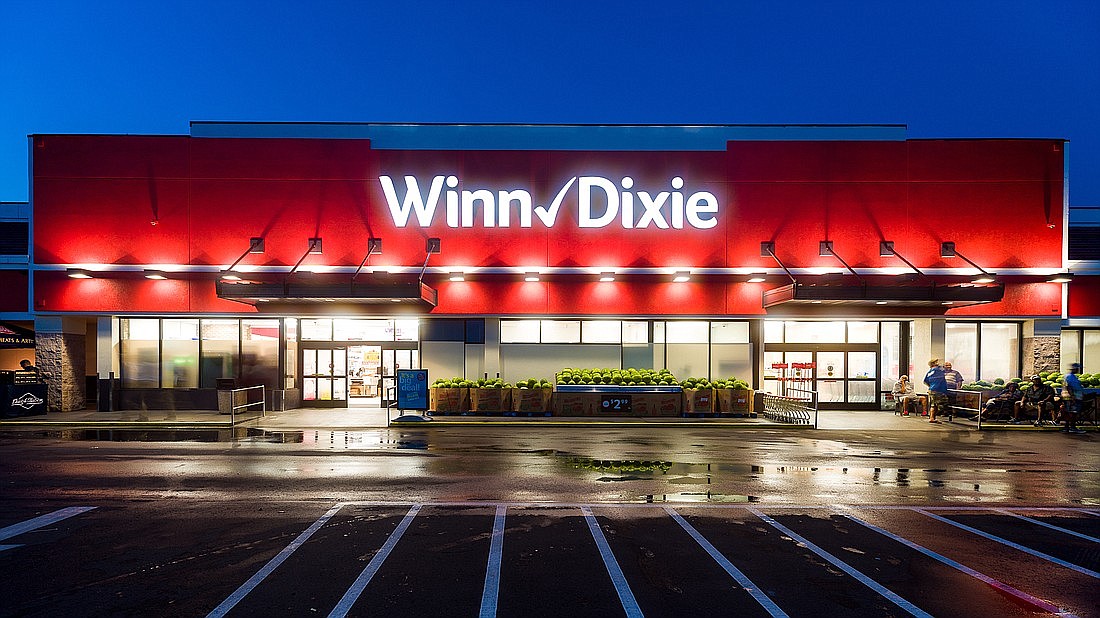
At the end of the last century, Winn-Dixie Stores Inc. stood as arguably Jacksonville’s most important company, the city’s only Fortune 500 firm and one of the largest grocers in the country with 1,188 stores in 12 states and $14 billion in annual sales.
Winn-Dixie was the biggest supermarket operator based in Florida, as Lakeland-based Publix Super Markets Inc. had 614 stores and $13 billion in sales in 1999.
However, a sales decline began in 2000 as Walmart Inc. and other new competitors took away Winn-Dixie customers, leading to a Chapter 11 bankruptcy filing in 2005.
While it survived bankruptcy, it became inevitable that Jacksonville would eventually lose Winn-Dixie as a major headquarters company.
It survived a merger with another supermarket chain and a second Chapter 11 reorganization but finally, on Aug. 16, Aldi announced an agreement to buy the company now known as Southeastern Grocers Inc.
Gone by 2024
The company headquartered in Jacksonville since 1944 will likely be gone by mid-2024, when Batavia, Illinois-based Aldi expects to complete its acquisition of Southeastern Grocers.
For decades, Winn-Dixie was controlled by the Davis family of Jacksonville who started the company in the mid-1920s and still controlled 36.5% of the stock when the company filed for a Chapter 11 bankruptcy reorganization in February 2005.
However, the reorganization wiped out all of the shareholders, including the Davises.
When Winn-Dixie emerged from Chapter 11 in November 2006, it maintained its West Jacksonville headquarters. But the company issued new stock and its largest shareholders were a group of investment firms who did not have any ties to Jacksonville.
Winn-Dixie was a much smaller company with 539 stores in five states at the end of fiscal 2006, and $7.2 billion in annual sales.
Analysts speculated that other supermarket chains would target Winn-Dixie for a buyout, including Kroger Co. and Delhaize Group, owner of the Food Lion chain.

Instead, it was a smaller chain, Bi-Lo LLC, that agreed to buy Winn-Dixie in 2012.
Greenville, South Carolina-based Bi-Lo, owned by Texas-based investment firm Lone Star Funds, had 206 stores at the time of the merger while Winn-Dixie had 480.
When the merger was completed in March 2012, the companies announced the headquarters of the combined company would be put in Winn-Dixie’s offices in Jacksonville.
Still, the Winn-Dixie and Bi-Lo merger made another deal inevitable. Investment firms like Lone Star generally look to cash out and make a profit down the road after they acquire corporations.
Lone Star did try to cash out when the merged company, renamed Southeastern Grocers, filed plans for an initial public offering in 2013.
However, Southeastern Grocers withdrew the IPO registration in August 2014.
Bankrupt again
Southeastern Grocers filed for bankruptcy again in 2018 with a prepackaged Chapter 11 reorganization plan.
The plan to exchange its debt for equity was preapproved by most of its creditors before the filing and Southeastern Grocers emerged out of bankruptcy in May 2018, two months after filing.
After the equity was distributed to creditors, Lone Star remained a minority stockholder with several other investment firms owning stakes in the company. Again, it was inevitable the firms would look to cash out.

The firms did pursue an IPO but after filing in October 2020, Southeastern Grocers pulled the stock sale off the market days before it was expected in January 2021 and it hasn’t tried for an IPO since then.
That again sparked speculation about a buyout before Aldi announced its agreement to buy the company.
Aldi is buying about 400 stores owned by Southeastern Grocers that operate under the Winn-Dixie and Harveys Supermarket grocery banners.
Southeastern Grocers also operates 28 stores under the Fresco y Más banner, which will be sold separately to an investment group.
The company discontinued the Bi-Lo banner in 2020.
As privately owned companies, Aldi and Southeastern Grocers don’t divulge financial data.
Southeastern Grocers’ final IPO filing in January 2021 said the company was the sixth largest conventional supermarket operator in the U.S. and it expected to report 2020 sales of about $8 billion. That would make Southeastern Grocers big enough to be a Fortune 500 company if it reported financial data publicly.
Fortune 500 loss
Jacksonville has lost Fortune 500 companies before, most notably Barnett Banks Inc.
Barnett was founded in Jacksonville in 1877 and was the dominant bank in Florida before it was acquired by NationsBank Corp. (now Bank of America Corp.) in 1998.

Like Winn-Dixie, Barnett was considered an inevitable acquisition target since interstate banking laws opened up in the 1980s and allowed mergers across state lines. Barnett was a coveted target of major national banks because of its strong position in Florida.
Bank of America maintains its Florida headquarters in Jacksonville and is a significant company in the area, but its corporate headquarters is in Charlotte, North Carolina.
Aldi has not revealed any specific plans for Jacksonville operations beyond the stores, saying it may convert some Southeastern Grocers locations to Aldi but also may continue operating stores under the Winn-Dixie and Harveys banners.
The company’s news release announcing the buyout agreement said Aldi recently opened a regional headquarters and distribution center in Loxley, Alabama, to serve its Southeast stores.
Southeastern Grocers said in an emailed statement that Aldi informed the company “that they anticipate very few changes at the Store Support Center in Jacksonville following the completion of the transaction.”
But even though a buyout of the company has been inevitable for two decades, it will be a loss for Jacksonville when one of its most significant corporate headquarters disappears.